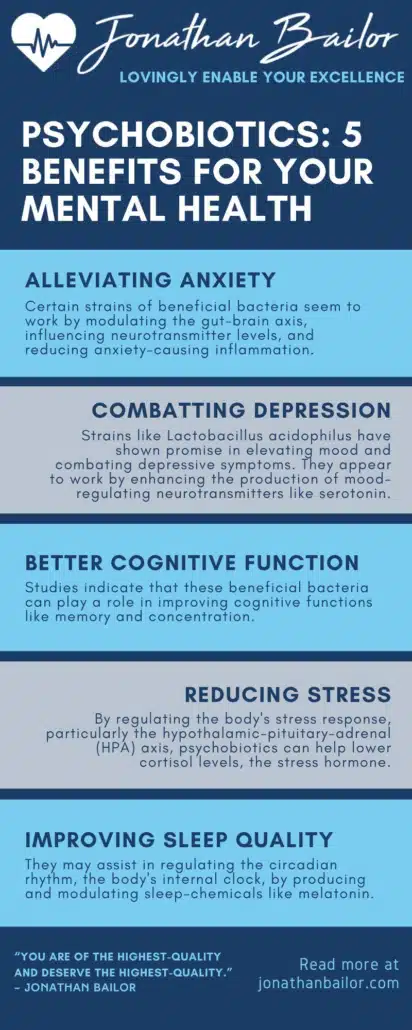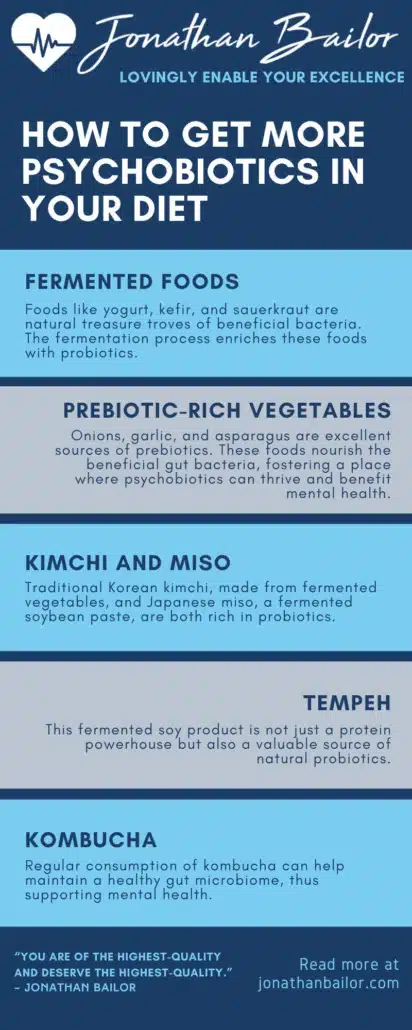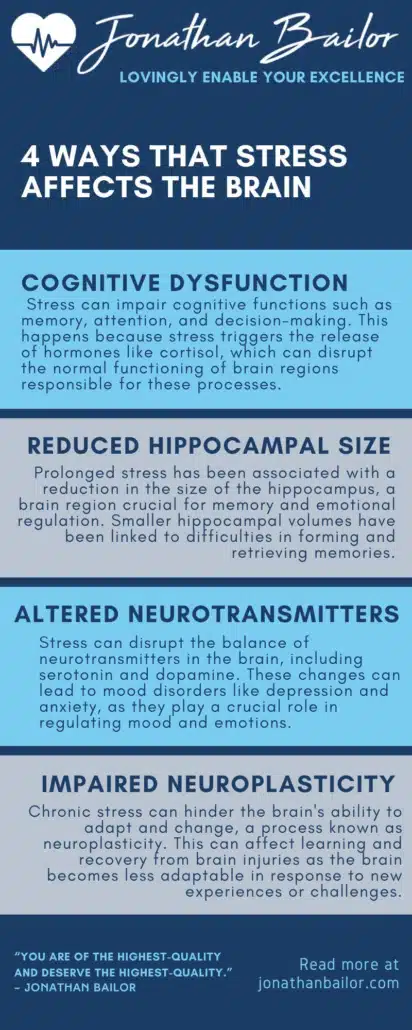Psychobiotics: The Next Frontier in Mental Health Care
In this Brain Health guide, Jonathan Bailor takes you on an empowering journey through the next frontier in mental health — Psychobiotics.
Imagine a world where a daily dose of friendly gut microbes not only keeps your gut happy but also brightens your mood and bolsters your mental health. Welcome to the emerging and fascinating world of psychobiotics! This isn’t science fiction; it’s the cutting edge of medical science, blending the lines between neurology and microbiology, opening new doors to mental wellness.
For years, we’ve known that our gut health plays a crucial role in our overall well-being. But did you know that it might hold the key to our mental health, too? The gut-brain connection, a hot topic in medical circles, reveals an intimate dance between our digestive system and mental state. This intricate relationship is where psychobiotics step in – a special kind of probiotics that have the potential to uplift our mental health. They’re not just any bacteria; these are specific strains that can influence our brain chemistry, potentially transforming how we approach mental health care.
Now, if you’re wondering how tiny gut microbiota can impact something as complex as our mental health, you’re not alone. It’s a question that has intrigued scientists and researchers alike, leading to groundbreaking studies and eye-opening discoveries. Psychobiotics could herald a new era in mental health care, shifting the focus from traditional treatments to a more holistic, body-mind approach.
This concept might seem overwhelming, but it’s rooted in the simplicity of nature’s interconnectedness. It’s about understanding that what happens in our gut doesn’t stay in our gut – it resonates throughout our entire body, including our brain. The beauty of psychobiotics lies in their natural, subtle approach to mental wellness, offering a ray of hope to many who seek a balance in their mental health journey.
As we launch this exploration of psychobiotics, remember that this is more than just about bacteria; it’s about a new understanding of mental health care. It’s about empowering ourselves with knowledge and embracing the potential of these microscopic allies. So, let’s take this step towards unlocking the secrets of our gut-brain connection and discover how nurturing our gut might be the key to nurturing our minds.
This journey into the world of psychobiotics isn’t just a leap into the future of mental health care; it’s a stride towards a happier, healthier you. And isn’t that a journey worth sharing? Share this with your friends and family because, who knows, psychobiotics might be the conversation starter that leads to a deeper understanding and appreciation of our mental well-being.
Unveiling the Mysteries of the Gut-Brain Axis
Before we dive into the realm of psychobiotics, it’s essential to unfold the narrative of the gut-brain axis, a pivotal character in this unfolding story of mental health. This axis is not just a biological term; it’s a bustling communication highway, where messages constantly travel between your gut and brain, influencing your emotions, thoughts, and overall mental state.
Integral to this communication highway is the vagus nerve and the enteric nervous system, often likened to the body’s superhighway of information. The vagus nerve, a long, meandering bundle of fibers, acts as a two-way street, sending signals from the brain to the gut and vice versa. It’s like a telegraph line, conveying emotions and stress levels to the gastrointestinal tract. The enteric nervous system, known as the second brain, resides in the gut wall, and its vast network of neurons plays a key role in the digestive process and in relaying gut feelings to the brain.
Picture this: within the intricate labyrinth of our bodies, the gut and brain are in constant conversation. This dialogue is facilitated by a diverse community of microbes residing in our gut, known as the microbiome. These microscopic inhabitants are like skilled conductors orchestrating a symphony of signals to our brain, impacting our mood, stress levels, and even our perception of the world.
Historically, the notion that our gut could significantly impact our mental state was a mere whisper in medical corridors. However, as science progressed, this whisper became a crescendo of evidence, highlighting the profound influence of gut-brain interactions. This intricate relationship sheds light on how our mental wellness could be rooted in the very core of our gut.
Understanding the gut-brain axis is akin to unlocking a secret door to our mental well-being. It’s not just about the food we consume; it’s about nurturing a harmonious relationship within, where our gut health echoes in the realms of our mental universe. This understanding is the first step in embracing the transformative power of psychobiotics, where the journey to mental health begins with nurturing the world within us.
The Transformative Power of Psychobiotics
Having explored the gut-brain axis, it’s time to turn our attention to psychobiotics, the next chapter in our mental wellness journey. Psychobiotics, a term that might seem like it’s borrowed from a sci-fi novel, is actually rooted in groundbreaking scientific research. These specialized probiotics are not just about aiding digestion; they are about revolutionizing mental health.
So, what exactly are psychobiotics? They are specific strains of bacteria, a subset of probiotics, designed to influence the mind positively. Imagine these as friendly microscopic agents navigating through our gut and sending uplifting messages to our brains. This is not just about digestion; it’s about a mind makeover.
These tiny but mighty microbes work their magic by modulating the gut microbiome – the diverse bacterial community within us. By altering this microbial landscape, psychobiotics have the potential to rebalance our mental health, influencing everything from our mood to our stress responses. They act like natural, internal therapists, providing a novel approach to mental health care, focusing on our gut to heal our minds. This concept isn’t just fascinating; it’s a testament to the power of nature and our body’s inherent wisdom in seeking balance and harmony.
Decoding the Intrigue of Psychobiotics
In our journey to comprehend psychobiotics, having brushed the surface of the gut-brain axis, we now step into the fascinating world of research that paints a clearer picture of these microscopic marvels. In a quest to unravel the mysteries of the human mind, the scientific community has been avidly studying psychobiotics, uncovering findings that are as intriguing as they are promising.
These studies have revealed a profound connection between specific strains of probiotics, such as Lactobacillus and Bifidobacterium, and improvements in mood and cognitive functions. Imagine these bacteria as tiny alchemists, transforming our gut’s environment and influencing our mental state. They don’t just reside passively in our digestive system; they actively participate in the production of neurotransmitters – the brain’s chemical messengers – and short-chain fatty acids, which significantly regulate our mood and cognitive functions.
What’s truly captivating is how these studies show psychobiotics influencing the levels of serotonin, the famed ‘feel-good’ neurotransmitter, and other critical compounds in our brain. This illuminates a path to potentially managing conditions like anxiety and depression, not through synthetic drugs but through harnessing the natural power of our gut microbiome. The science behind psychobiotics isn’t just a chapter in a textbook; it’s a beacon of hope, shedding light on how nurturing our gut flora could be a key to unlocking better mental health.
Psychobiotics: 5 Mental Health Benefits
As we venture deeper into the world of psychobiotics, it becomes increasingly clear that these microscopic allies offer more than just gut health benefits. They are emerging as powerful tools in enhancing mental wellness, bringing forth a new perspective on mental illness health care.
Let’s illuminate five remarkable mental health benefits of psychobiotics, each a testament to the profound impact these tiny organisms can have on our overall well-being.
1. Alleviating Anxiety
Anxiety, often a shadow lurking in the recesses of our minds, can be gently eased by psychobiotics. Research suggests that certain strains of gut bacteria, such as Lactobacillus helveticus and Bifidobacterium longum, often found in probiotic supplements, can help treat anxiety, reducing anxiety levels due to their effect on the nervous system. They seem to work by modulating the gut-brain axis, influencing neurotransmitter levels, and reducing inflammation, which is often linked to anxiety.
Imagine these bacteria as soothing agents, sending calming signals to the brain, helping to quell the storm of anxiety, and offering a natural alternative to traditional anxiety management.
2. Combatting Depression
Depression is one of the most common mental illnesses. In the battle against depression, psychobiotics could be unlikely yet potent allies. Strains like Lactobacillus acidophilus have shown promise in elevating mood and combating depressive symptoms. They appear to work by enhancing the production of mood-regulating neurotransmitters like serotonin, often dubbed the ‘happiness chemical.’
In this way, psychobiotics could be pivotal in forging a new path in depression treatment, one that harnesses the natural balance of our gut microbiome to uplift our mental state.
3. Enhancing Cognitive Function
The brilliance of the human mind could be further polished with the help of psychobiotics. Studies indicate that these beneficial bacteria can play a role in improving cognitive functions like memory and concentration. This is likely due to their influence on the production of brain-derived neurotrophic factor (BDNF), a protein integral in brain health.
Psychobiotics could thus be key players in sharpening our mental acuity, helping us to maintain a clear and focused mind.
4. Reducing Stress
The modern world’s relentless pace often leaves us grappling with stress. Psychobiotics offer a natural avenue to mitigate this pervasive issue. By regulating the body’s stress response, particularly the hypothalamic-pituitary-adrenal (HPA) axis, psychobiotics can help lower cortisol levels, the body’s primary stress hormone. This action can lead to a more balanced mood and a heightened sense of calm, making psychobiotics a potential cornerstone in stress management.
Incidentally, stress is associated with the development of irritable bowel syndrome (IBS) and inflammatory bowel disease (IBD).
5. Improving Sleep Quality
A good night’s sleep is crucial for mental health, and psychobiotics could be instrumental in achieving this. They may assist in regulating the circadian rhythm, the body’s internal clock, by producing and modulating sleep-inducing chemicals like melatonin.
Furthermore, psychobiotics can create a conducive environment for restful sleep by reducing stress and anxiety, making them valuable allies in our quest for a peaceful slumber.
In summary, psychobiotics are not just gut health enhancers but are emerging as a beacon of hope in various aspects of mental health care. From easing anxiety to improving cognitive functions, their potential benefits are as diverse as they are profound.
As we continue exploring and understanding these benefits, psychobiotics could become a mainstay in our journey toward optimal mental wellness.

Feeling Better Is Priceless, That's Why We Don't Put A Price On It!
“It’s Like A Free and Medically Valid Version of Noom and Weight Watchers Online”
~ Dr. Doctor Matthew Oleshiak, MD
Click the 'LEARN MORE' button below for free lifetime access to the fast fix program developed by Jonathan and top Ivy League Medical Doctors
LEARN MOREP.S. It's not a free trial. It's not part of the program for free. The entire program is free, forever, for real! No credit card needed.
Nourishing Your Mind: Psychobiotics in Your Diet
Our diet plays a starring role in the quest to enhance mental wellness through psychobiotics. Just as gardeners nurture the soil to grow a flourishing garden, we can cultivate our gut health with foods rich in psychobiotics. These dietary choices are not just meals; they nourish our mental well-being.
Let’s explore some key ways to incorporate psychobiotics into our diet, each a stepping stone towards a harmonious gut-brain relationship.
Fermented Foods
Foods like yogurt, kefir, and sauerkraut are natural treasure troves of beneficial bacteria. The fermentation process enriches these foods with probiotics, which can enhance the microbiome’s diversity and functionality, contributing to improved mental health.
Prebiotic-Rich Vegetables
Onions, garlic, and asparagus are excellent sources of prebiotics. These foods nourish the beneficial gut bacteria, fostering an environment where psychobiotics can thrive and positively affect mental health.
Kimchi and Miso
Traditional Korean kimchi, made from fermented vegetables, and Japanese miso, a fermented soybean paste, are both rich in probiotics. These foods offer a unique blend of bacteria that can positively influence the gut-brain connection.
Tempeh
This fermented soy product is not just a protein powerhouse but also a valuable source of natural probiotics. Its fermentation process makes it a conducive environment for psychobiotic growth, aiding mental well-being.
Kombucha
This effervescent fermented tea is gaining popularity not just for its unique taste but also for its probiotic content. Regular consumption of kombucha can help maintain a healthy gut microbiome, thus supporting mental health.
Incorporating these foods into your daily diet can be a delightful and nutritious way to support your mental health. Each bite or sip is an investment in your gut-brain harmony, paving the way for a balanced and joyful mind.

Brain Health Decoded: Your Questions Answered
In the journey of understanding our health, the brain stands as a complex and fascinating organ, often shrouded in mystery. With its vital role in every aspect of our lives, questions naturally arise about how to nurture and protect this crucial part of ourselves.
Here are five frequently asked questions about brain health, each answered to shed light on how to maintain and enhance this remarkable organ.
What are the best foods for brain health?
Nourishing your brain starts with what you put on your plate. Foods rich in omega-3 fatty acids, like salmon and walnuts, are excellent for brain health, supporting nerve cell structure. Antioxidant-rich foods like blueberries can protect the brain from oxidative stress. Leafy greens, like spinach and kale, contribute essential vitamins and minerals.
Incorporating these foods into your diet can bolster brain function and protect against cognitive decline.
How does sleep affect the brain?
Sleep is like a restorative balm for the brain, playing a critical role in both cognitive functions and mental health. During sleep, the brain removes toxins that accumulate throughout the day, a process crucial for preventing neurodegenerative diseases. Adequate sleep enhances memory, learning, problem-solving skills, and creativity.
On the flip side, sleep deprivation can lead to impaired judgment, mood swings, and increased risk of neurological disorders. Prioritizing good sleep hygiene is, therefore, paramount for brain health.
Can exercise improve brain function?
Exercise is not just for the body; it’s a tonic for the brain as well. Regular physical activity boosts blood flow to the brain, enhancing cognitive abilities and lowering the risk of disorders like Alzheimer’s disease. It stimulates the production of neurotrophic factors, aiding brain cell growth and repair.
Even simple activities like walking or cycling can have a profound impact on improving memory, attention, and mental clarity.
What impact does stress have on the brain?
Chronic stress is a formidable adversary to brain health. It can lead to the shrinkage of the prefrontal cortex, the area of the brain responsible for memory and learning, and enlarge the amygdala, making the brain more receptive to stress. Prolonged stress can disrupt synapse regulation, leading to a decrease in cognitive functions and an increased risk of mental health disorders.
Managing stress through relaxation techniques, mindfulness, and adequate rest is vital for maintaining brain health.
How does social interaction affect brain health?
Our brains thrive on social interaction. Engaging in meaningful social activities stimulates brain areas involved in emotional regulation and cognitive processing. It can lower the risk of memory-related disorders and improve psychological well-being.
Conversely, social isolation can negatively impact brain health, potentially leading to cognitive decline and mental health issues. Cultivating a healthy social life is integral to maintaining a healthy brain.
Understanding and caring for our brain is essential for overall well-being. As we navigate through these aspects, we empower ourselves with knowledge, paving the way for a mentally enriched and fulfilling life.

The Journey to Gut Wisdom
As we conclude our exploration into the fascinating world of gut health and psychobiotics, it’s clear that this journey is about more than just scientific discovery; it’s about embracing a new frontier in understanding our bodies and minds.
We’ve uncovered the intricate dance of the gut-brain axis, the transformative potential of psychobiotics, and the profound benefits they hold for mental wellness. This story of hope, health, and harmony is waiting to be shared.
So, spread the word with your friends and family across social media platforms and via email. Let’s collectively step into a future where nurturing our gut is synonymous with nurturing our mind, opening doors to a healthier, happier life.
Feeling Better Is Priceless, That's Why We Don't Put A Price On It!
“It’s Like A Free and Medically Valid Version of Noom and Weight Watchers Online”
~ Dr. Doctor Matthew Oleshiak, MD
Click the 'LEARN MORE' button below for free lifetime access to the fast fix program developed by Jonathan and top Ivy League Medical Doctors
LEARN MOREP.S. It's not a free trial. It's not part of the program for free. The entire program is free, forever, for real! No credit card needed.




